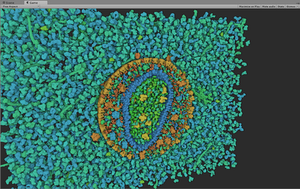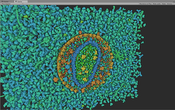Information
- Publication Type: Conference Paper
- Workgroup(s)/Project(s):
- Date: September 2015
- ISBN: 978-3-905674-82-8
- Publisher: The Eurographics Association
- Organization: EG Digital Library
- Location: Chester, United Kingdom
- Lecturer: Mathieu Le Muzic
- ISSN: 2070-5786
- Editor: Katja Bühler and Lars Linsen and Nigel W. John
- Booktitle: Eurographics Workshop on Visual Computing for Biology and Medicine
- Conference date: 14. September 2015 – 15. September 2015
- Pages: 61 – 70
Abstract
In this article we introduce cellVIEW, a new system to interactively visualize large biomolecular datasets on the atomic level. Our tool is unique and has been specifically designed to match the ambitions of our domain experts to model and interactively visualize structures comprised of several billions atom. The cellVIEW system integrates acceleration techniques to allow for real-time graphics performance of 60 Hz display rate on datasets representing large viruses and bacterial organisms. Inspired by the work of scientific illustrators, we propose a level-of-detail scheme which purpose is two-fold: accelerating the rendering and reducing visual clutter. The main part of our datasets is made out of macromolecules, but it also comprises nucleic acids strands which are stored as sets of control points. For that specific case, we extend our rendering method to support the dynamic generation of DNA strands directly on the GPU. It is noteworthy that our tool has been directly implemented inside a game engine. We chose to rely on a third party engine to reduce software development work-load and to make bleeding-edge graphics techniques more accessible to the end-users. To our knowledge cellVIEW is the only suitable solution for interactive visualization of large bimolecular landscapes on the atomic level and is freely available to use and extend.Additional Files and Images
Weblinks
No further information available.BibTeX
@inproceedings{cellVIEW_2015,
title = "cellVIEW: a Tool for Illustrative and Multi-Scale Rendering
of Large Biomolecular Datasets",
author = "Mathieu Le Muzic and Ludovic Autin and Julius Parulek and
Ivan Viola",
year = "2015",
abstract = "In this article we introduce cellVIEW, a new system to
interactively visualize large biomolecular datasets on the
atomic level. Our tool is unique and has been specifically
designed to match the ambitions of our domain experts to
model and interactively visualize structures comprised of
several billions atom. The cellVIEW system integrates
acceleration techniques to allow for real-time graphics
performance of 60 Hz display rate on datasets representing
large viruses and bacterial organisms. Inspired by the work
of scientific illustrators, we propose a level-of-detail
scheme which purpose is two-fold: accelerating the rendering
and reducing visual clutter. The main part of our datasets
is made out of macromolecules, but it also comprises nucleic
acids strands which are stored as sets of control points.
For that specific case, we extend our rendering method to
support the dynamic generation of DNA strands directly on
the GPU. It is noteworthy that our tool has been directly
implemented inside a game engine. We chose to rely on a
third party engine to reduce software development work-load
and to make bleeding-edge graphics techniques more
accessible to the end-users. To our knowledge cellVIEW is
the only suitable solution for interactive visualization of
large bimolecular landscapes on the atomic level and is
freely available to use and extend.",
month = sep,
isbn = "978-3-905674-82-8",
publisher = "The Eurographics Association",
organization = "EG Digital Library",
location = "Chester, United Kingdom",
issn = "2070-5786",
editor = "Katja B\"{u}hler and Lars Linsen and Nigel W. John",
booktitle = "Eurographics Workshop on Visual Computing for Biology and
Medicine",
pages = "61--70",
URL = "https://www.cg.tuwien.ac.at/research/publications/2015/cellVIEW_2015/",
}



 paper
paper
